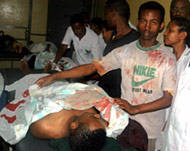Addis Ababa quiet, tense after protests
Ethiopian authorities have slapped tight surveillance on opposition leaders and residents of Addis Ababa after more than 25 people were killed in clashes between security forces and demonstrators.

Police announced that the death toll had risen from 22 to 26 on Thursday after four injured people succumbed to their wounds overnight. Police said 10 bodies remained unclaimed at city hospitals.
The leaders of the country’s main opposition group, the Coalition for Unity and Democracy (CUD), said they were under close watch but were no longer confined to their homes as they had been during Wednesday’s violence.
Opposition targeted
At the same time, they said 14 CUD members had been arrested in the hours after police opened fire on crowds on Wednesday during protests against disputed elections last month. In addition to the 26 killed, hundreds were wounded.
“Today I went out and managed to go to the office, but three cars are still following me and one car is constantly parked in front of my house,” CUD chairman Hailu Shewal told reporters.
|
“Three cars are still following me and one car is constantly parked in front of my house” Hailu Shewal, |
The European Union had protested to the government about Hailu’s house arrest and restrictions placed on the movement of other CUD officials, including vice-chairman Berhanu Nega.
Berhanu on Thursday said he, too, was able to leave his home but was also being followed by cars of plain-clothed police.
Sweeping arrests
Admasso Melaku, an assistant to the CUD’s executive committee, said that 14 of the group’s administrative staff – 12 in Addis Ababa and two in the town of Jimma – had been arrested late on Wednesday and on Thursday morning.
Government officials could not immediately confirm those arrests.
Meanwhile, police and special forces military units patrolled the tense and near-deserted streets of Addis Ababa as most residents of the capital stayed indoors, fearing new outbreaks of the violence that the government has blamed on the CUD.
The capital’s normally ubiquitous blue-and-white Lada taxicabs and mini-buses were nowhere to be seen as a strike by drivers, called in sympathy with the protesters, continued for a second day despite orders from the city administration for a return to work.
Although some small vendors opened their stalls and government-owned enterprises were operating, private banks, insurance companies and other concerns kept their doors shuttered.
Businesses closed
In the Mercato district, where the worst violence took place 24 hours earlier, virtually all shops, cafes, restaurants were closed.
“I’m afraid to open,” said shopkeeper Edris Abdu. “I’m waiting for the others in my neighbourhood. If they do open I will.”
Small groups of people milled about in some areas and pedestrians could be seen, but the downtown area was eerily quiet.
The government has warned of severe consequences for anyone attempting to protest against alleged ruling party fraud in the 15 May polls in defiance of a government ban on demonstrations.
Regrets over deaths
 |
|
Wednesday’s violence left 26 |
The government has said it regrets the deaths but has accused the opposition of fomenting illegal protests and violence and maintains the police acted to stop hooligans from robbing a bank and attempting a jail break.
However, many of the wounded claim they were shot by security forces for no reason and were merely passers-by caught up in clashes between police and stone-throwing demonstrators.
The European Union, the United States, Britain and the United Nations have condemned the violence and called for restraint from the government of Prime Minister Meles Zenawi and the opposition.
EU development commissioner Louis Michel on Thursday spoke with Meles to voice “deep concerns” and urge “tolerance and restraint on the use of force”, officials said.
EU plea
A similar call came from EU foreign policy chief Javier Solana, who called on government and opposition to find a compromise to achieve a peaceful solution to the crisis.
The opposition is unconvinced by provisional election results that gave it a huge boost to about a third of the parliamentary seats, up from 12 in the previous assembly, but keep the ruling party in power.
It accuses the ruling Ethiopian People’s Democratic Front (EPRDF) of trying to steal the polls with ballot rigging and is trying to quash the certification of results by the election board.
The board had been due on Wednesday to validate those results, which give the EPRDF a majority in parliament, but last week announced a month-long delay due to the volume of complaints it has to investigate.